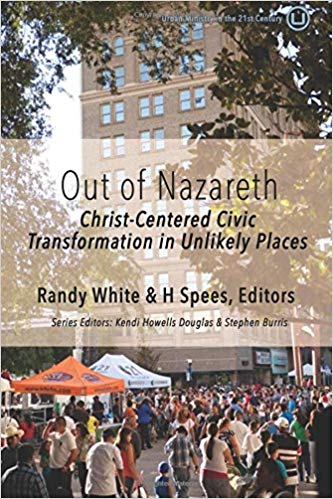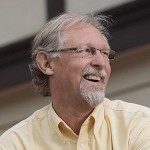
Catalyzing Transformational City Movements is the second chapter in Dr. Randy White and H Spees new book “Out of Nazareth: Christ-Centered Civic Transformation In Unlikely Places” available at Amazon.com.
They have made this entire chapter available to us as a whitepaper. Email us at info@significantmatters.com and we will send you the pdf file.
For this article we pulled from a section entitled: Faith-Rooted Social Enterprise and Entrepreneurship
It was this work that first caught my eye because it demonstrates the need to think differently about how we use our charitable dollars to help people lift themselves out of poverty. It doesn’t make much sense to take someone through a class on entrepreneurship and show them how to start and run a business if at the end of the process they have no access to the capital they need to start a business. Dr. White and the folks working together in Fresno “closed the loop in their logic” when they decided their entrepreneurship program needed to provide start-up capital along with training and mentoring if it was going to make a real difference. And thus was born, The Spark Tank!
Tom Bassford
Faith-Rooted Social Enterprise and Entrepreneurship
Our research team published these stories and dozens more in a book called The Work of Our Hands: Faith Rooted Approaches to Job Creation, Job Training, or Job Placement in a Context of Concentrated Poverty (Condeopress.com, 2012). We then gave this book to 75% of all churches in Fresno, all faith-based nonprofits, 400 businesspeople, and the Mayor and City Council members. This had the impact of validating the category of social enterprise as a legitimate form of ministry and a viable strategy for poverty alleviation. But after this accomplishment we began to sense that more was required. If we had hoped to stimulate a movement of faith-rooted social enterprise, we would have to invest more in the model.
The Center for Community Transformation (CCT) at Fresno Pacific Biblical Seminary, acting as an institutional backbone for this aspect of the movement, began a series of summits on social enterprise. We hoped a modest 40 or 50 leaders would show up for the first summit, since it was such an out-of-the-box subject. But more than 120 came. The next year it was 140. The next year 175, and the momentum builds. The speakers and workshops all focused on why and how faith-based institutions are good hosts for social businesses. We laid both theological and pragmatic foundations, and we invited businesspeople to bring their skill sets to the table.
At the same time as these growing summits, the CCT raised money for a pitch-fest competition for social enterprise ideas that we called the Spark Tank. In the first year we raised a mere $7,500 and awarded three proposals put forward by churches and nonprofits for social enterprise models. We call these investments, not grants. One church designed a street level ad design and distribution model, Say Hello Advertising, that can saturate a business district with fliers, employing indigenous members of an inner-city neighborhood who hand-deliver them for less than the price of bulk mail. A nonprofit designed an inner-city fitness club called 701 United for kids in the highest crime zip code, each of whom pay $15 per month to learn martial arts and get in shape. But they are simultaneously taught conflict mediation and Christian discipleship. They are mentored and poured into by caring staff.
![]() In the second year we raised double the amount ($15,000) and awarded seven proposals, including a cleaning service at a local women’s shelter (Five Gals Cleaning), a translation services business at the local refugee ministry (FIRM Translation), a water-wise landscaping company at a local church (RockPile Yard Service) employing formerly incarcerated men, and a café at a local nonprofit employing fatherless young men (YMI Café).
In the second year we raised double the amount ($15,000) and awarded seven proposals, including a cleaning service at a local women’s shelter (Five Gals Cleaning), a translation services business at the local refugee ministry (FIRM Translation), a water-wise landscaping company at a local church (RockPile Yard Service) employing formerly incarcerated men, and a café at a local nonprofit employing fatherless young men (YMI Café).
In the third year we raised $26,000 and awarded 10 proposals, including a café to employ people coming out of the rescue mission program (Tree of Life Café). Ten additional start-ups were awarded investments in this year’s Spark Tank.
In each of these cases, we sent staff from each church or nonprofit to a series of business classes offered by the Small Business Administration, as well as assigned MBA students from the University to walk alongside them and accomplish small projects to help them get off the ground. We also made mentors available to them. As a backbone organization to this part of the transformational movement in our city, these are the small facilitations and encouragements necessary to turn the flicker into a full flame. It’s too early to tell whether this will generate its own momentum beyond what we as an institution orchestrate. The escalating amounts of money being raised, the increased numbers of every summit, the clear growth in the number of proposals being submitted every year all suggest that this has the potential for becoming a strong stream in support of the transformation of our Valley. Only time will tell.

Hear Dr. Randy White at this year’s SATtalks, October 24-26
Randy has been an urban activist and practitioner for more than 25 years. He was the founder of Fresno Institute for Urban Leadership and many other urban training formats in Fresno. Globally he led doctoral programs of Bakke Graduate University helping leaders from 39 countries imagine and implement new forms of community transformation. In 2012 he founded the Center for Community Transformation at Fresno Pacific University. He is the author of many books and articles on urban ministry.
The Center for Community Transformation utilizes the business and social assets of the faith community to address the deepest economic, physical and spiritual challenges of the community. They do that by enhancing the capacities of faith organizations to start social enterprises, equip members and neighbors for financial stability, provide new skills sets for people with barriers to employment, and train congregations for community engagement. Click here to learn more about The Center for Community Transformation.
Leave A Comment
You must be logged in to post a comment.